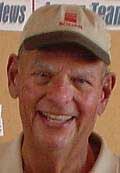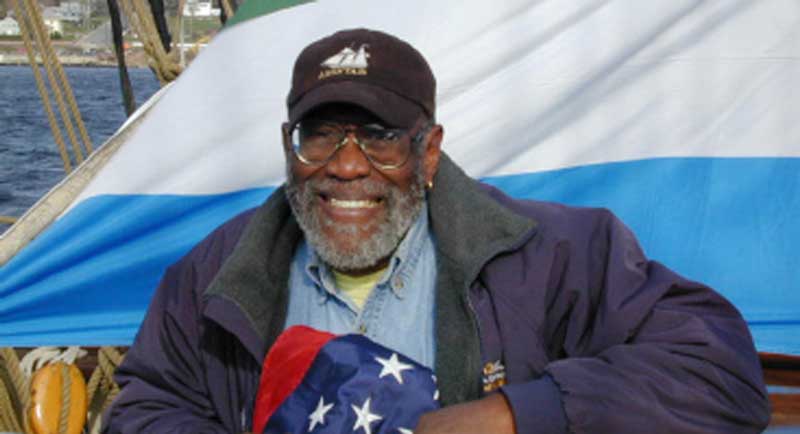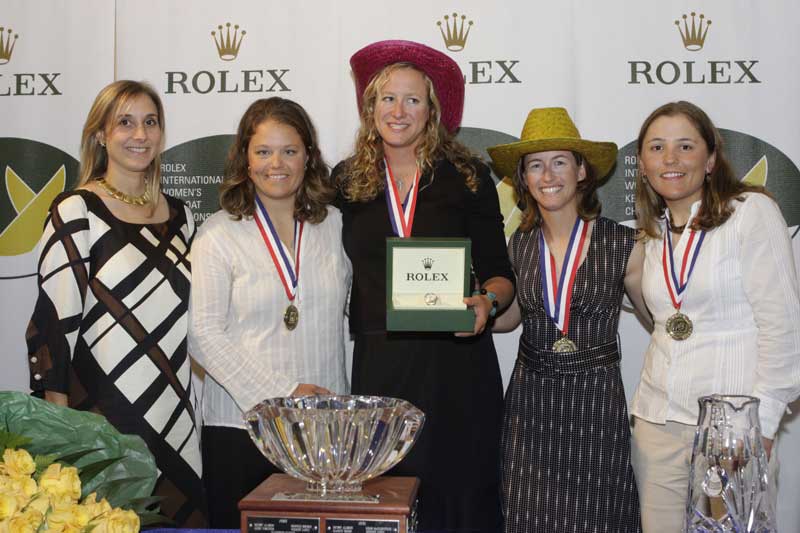|
Team Captain Hook
In August 2006, Bert Foster, a longtime Wayzata
Minnesota Yacht Club member, past Commodore, and
race committee chairman went to Newport, Rhode
Island at the invitation of Paralympics Coach
Betsy Alison. Bert had raced Ensigns for 18 years
and Sonars for 21 years at WYC. Bert secured a
mainsail trimming position in the 4-day Clagett
Clinic and Regatta.
Bert learned that he was impressed and intrigued
by 3-person Paralympics format Sonar sailing and
he learned that he was a lousy mainsheet trimmer
due partly to having one non-functional arm, a
lack of strength in the other arm and his overall
age at nearly 70. Bert knew his only option was to
be at the helm of his own boat.
After his return to Wayzata, his long-time Sonar
partner and able bodied mainsail trimmer, Ernie
Brody made a very generous offer. "If you put the
team together, I will be your Boatswain. Stephanie
(Brody) and I will come to every regatta, in our
motor home, and take care of the boat, including
putting all of the special adaptive equipment on
it and tricking it out with the go-fast goodies."
Bert couldn't refuse and started putting a team
together.
Selection for the US Disabled Sailing team
required participation in three qualifying
regattas. They would happen in the next four
months with the Miami Olympic Classes Regatta in
January. Team Captain Hook, (Bert wears a hook on
his right arm) finished third overall and
qualified as the second boat of the US Disabled
Sailing Team.
The team achieved moderate success during the
winter regatta season in Florida. In order to take
themselves to next level, three 10 day training
sessions were scheduled in May, June and July.
Former Olympic Sailing Coach Gordy Bowers
conducted the sessions. In August the team went to
Chicago and won the North American Disabled
Championship. The Paralympics Selection Trials
were scheduled for October in Newport. They would
be 16 races in nine days.
 |
 |
| Bert Foster |
Captain Bill Pinkney |
The number one boat of the US Disabled Sailing
Team, skippered by Rick Doerr of Clifton, New
Jersey held a slim lead through the first three
days. But on day four, Captain Hook slipped into
first place by one point. The next day was a
layover day and Bert's 71st birthday. He enjoyed
his pedestal position the entire day!
The day or moment was short lived. Shifty winds
and fierce competition from Doerr and the fleet
put Rick back in the lead by a slim margin. It
stayed this way through day eight. On the final
race of the final day, Captain Hook needed to win
and keep Doerr two boats back. The competition was
tight with several lead changes. Rick Doerr sailed
an excellent race and will represent the U.S. in
China.
Bert put a gallant effort together for a
Paralympics campaign in only ten months. In the
finals, they took four firsts and Doerr took five
firsts. After the regatta, Paralympics Coach Betsy
Alison invited Team Captain Hook to be the
training partner for the Doerr team. They are
going to China!
Captain Bill Pinkney
Captain Bill Pinkney is a product of Chicago's
Southside. After a corporate career, he became the
first black man to sail solo around the world. He
became Master of the replica Amistad, the freedom
ship, when it was still timbers in Connecticut
where he oversaw the building of the ship as it
took its beautiful form. He cherishes the part
that he was able to play.
Pinkney's most sought after goal was to arrive at
the shores of his ancestral home continent Africa
as the Master of a sailing ship, remembering his
ancestors that left as cargo on sailing ships.
As Pinkney traveled back home and then to the west
coast of Africa (another Captain sailed across the
Atlantic), he wrote about his visit to Portugal, a
country that had a monopoly on the export of
slaves for 200 years.
"As the sun sets in the west, a glow that comes
not from the sky lights the path to new horizons.
Amistad is departing Portugal with a glow of
accomplishment, for the ship, for the programs,
for our state and for the nation."
"During our stay in this beautiful country we have
met face to face and presented the Amistad story
to over 800 students from the schools in Lisbon,
we traveled to the sites of the beginnings of the
Atlantic Slave Trade, participated in a colloquium
with leading Portuguese scholars, were visited by
the American Ambassador and his staff, and were
welcomed by dancers from Angola, Guinea-Bissau,
Cape Verde and other Afro-Portuguese communities
accompanied by drummers from Brazil.
The highlight of our stay was the Inter-Faith day
sail. Our beautiful vessel glided smoothly down
the river under the bridge that is a smaller
version of the Golden Gate. The sails were raised
by young women and men from the Jewish and Muslim
communities side by side with our students and
crew, many of whom were Christian. (They were)
talking, laughing and sharing the lyrics of songs
that they all know. This whole scene was being
looked down upon from the hill next to the bridge
by the statue of Christ the Redeemer. (It) is the
same as the one that looks down on the harbor of
Rio de Janeiro.
This is why we came; to bring people together to
explore not the differences but rather their
similarities. We had started the ball rolling;
members of the organizers were ecstatic and
saddened that we could not do more of these types
of sails. I introduced them to a local ship owner
who had the perfect site to continue this type of
interaction long after we were gone.
Our presence in Lisbon and everywhere we went in
Portugal was a statement of what Amistad means:
Friendship. We made friends everywhere, our
interpreters, our dock mates, the Immigration
Police who stopped over regularly to see how we
were doing, and just plain Amistad "groupies". Our
stay in Cascais, Portugal was wonderful. The
beauty, tranquility and facilities will be hard to
reproduce as we move south.
Yes, there is a glow as we leave, not only in our
hearts but in the smiles of those who watch us
depart."
Pinkney arrived in Sierra Leone, Africa in
December. He is Master of a Sailing Vessel, the
Freedom Ship, Amistad. He has had an amazing year.
Sally Barkow
Sally Barkow, the Nashotah, Wisconsin native and
her crew have spent the best part of 2007 gaining
experience in preparation for the 2008 Olympics
racing aboard the Yngling. Known as Team 7, the
team is made up of Barkow; Carrie Howe from Grosse
Pointe Farms, Michigan; Debbie Capozzi from
Bayport, New York; and additional members who come
aboard the bigger boats to fill out the crew.
Together they've been paying their dues in a vast
learning curve through most of 2007 with a mixture
of success and near success in a consistent trend
toward a higher level of sailing.
 |
| Prize ceremony at the Houston Yacht club.
From left: Colette Bennett, Rolex Watch USA,
Sally Barkow, Annie Lush, Amanda Callahan and
Debbie Capozzi, 2007 Rolex International
Women's Keelboat Championship winners.
ROLEX/Dan Nerney |
Although the team won the Yngling worlds in 2005,
they were third in 2006 and second in 2007,
proving how greatly improved the racing
competition has become. Recently, the two times
defending Olympic Champion from Britain was
eliminated in her country's trials by Sarah Ayton
who also finished first over the Barkow team at
this year's Yngling worlds.
Unlike previous Olympics, the 2008 version will
focus on super races in the finals which count
double and some match racing. These are skill sets
which must be mastered in the tricky currents off
Qingdao, China, the Olympic sailing venue.
In the match racing piece of the competition, Team
7 won the BoatU.S. Santa Maria Match Race
Championships, in J-22s. They also won the Brasils
Women's Cup Match Racing in Swedish Match 40s and
fared well in the International One Design 33s.
The Yngling regattas have been a mixed bag as the
competition has really stepped it up worldwide.
They opened the year with a win in the Miami
Olympic Classes Regatta, followed by a second in
the Yngling Worlds. Then in Europe, they took gold
at Palma de Mallorca, Spain; silver at Semaine
Olympique Francaise; and, a sixth at the Breitling
Regatta in Holland. The China experience followed
with a fourth in tricky conditions at Qingdao.
Team 7 finally came home to Houston, Texas to
defend the Rolex International Keelboat
Championship in a chartered J-22. After a rough
start, they took over first on day two and
remained there for the rest of the regatta, taking
the last race off to pack up the boat. "We pulled
off the hat trick," noted the exuberant crew. "We
hope all this preparation pays off (in the
Olympics)."
Look for Team 7 with skipper Sally Barkow, crew
Debbie Capozzi and Carrie Howe to represent the
U.S. well in China.
Thom Burns publishes Northern Breezes Sailing
Magazine and Sailing Breezes Internet Magazine.
TOP/images/top.jpg)
|



